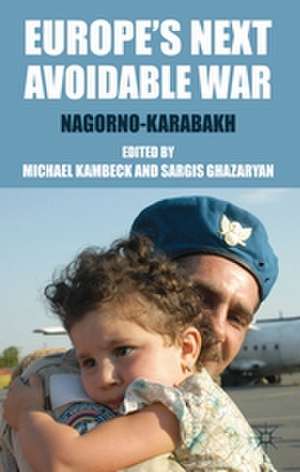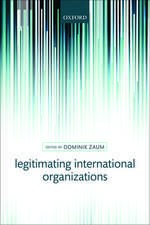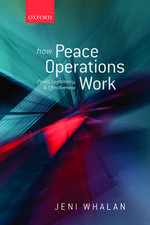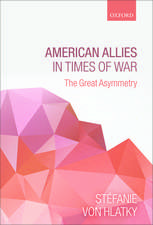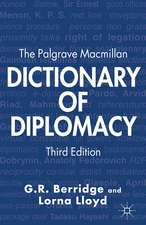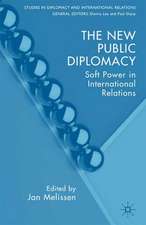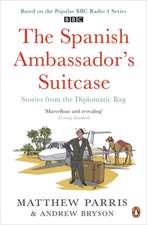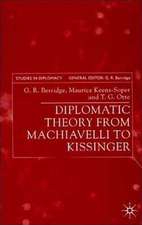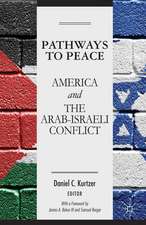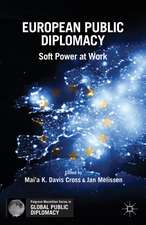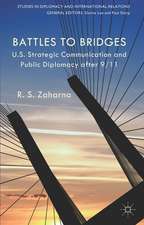Europe's Next Avoidable War: Nagorno-Karabakh
Editat de M. Kambeck, S. Ghazaryanen Limba Engleză Hardback – 5 mar 2013
| Toate formatele și edițiile | Preț | Express |
|---|---|---|
| Paperback (1) | 385.25 lei 6-8 săpt. | |
| Palgrave Macmillan UK – 2013 | 385.25 lei 6-8 săpt. | |
| Hardback (1) | 391.61 lei 6-8 săpt. | |
| Palgrave Macmillan UK – 5 mar 2013 | 391.61 lei 6-8 săpt. |
Preț: 391.61 lei
Nou
Puncte Express: 587
Preț estimativ în valută:
74.94€ • 77.95$ • 61.87£
74.94€ • 77.95$ • 61.87£
Carte tipărită la comandă
Livrare economică 14-28 aprilie
Preluare comenzi: 021 569.72.76
Specificații
ISBN-13: 9780230300668
ISBN-10: 0230300669
Pagini: 277
Ilustrații: XXII, 277 p.
Dimensiuni: 140 x 216 x 23 mm
Greutate: 0.5 kg
Ediția:2013
Editura: Palgrave Macmillan UK
Colecția Palgrave Macmillan
Locul publicării:London, United Kingdom
ISBN-10: 0230300669
Pagini: 277
Ilustrații: XXII, 277 p.
Dimensiuni: 140 x 216 x 23 mm
Greutate: 0.5 kg
Ediția:2013
Editura: Palgrave Macmillan UK
Colecția Palgrave Macmillan
Locul publicării:London, United Kingdom
Cuprins
Introduction: Setting the Geopolitical Stage; S.Ghazaryan PART I: APPROACHING THE CONFLICT: THE INTERNAL RATIONALE The Quintessential Conflict: A Cultural and Historic Analysis of Nagorno-Karabakh; B.Coulie A Case Sui Generis: Nagorno-Karabakh in Comparison with Other Ethnic Conflicts in Eastern Europe; U.Halbach What the People Think: Town Hall Meetings Reveal the EU's Potential and Limits in the Nagorno-Karabakh Conflict; T.Poghosyan & A.Martirosyan What the People Think: Key Findings and Observations of a Town Hall Meeting Project in Azerbaijan, Armenia and Nagorno-Karabakh; T.Poghosyan & A.Martirosyan Nagorno-Karabakh: Learning from the Flemish Experience within Belgium?; D.Rochtus The Nagorno-Karabakh Conflict in Light of Polls in Armenia and Nagorno-Karabakh; A.Cooper and K. Morris PART II: THE INTERNATIONAL COMMUNITY AS FOREIGN POLICY ACTORS IN N-K: THE EXTERNAL RATIONALE The EU's New Foreign Policy and Its Impact on the Nagorno-Karabakh Conflict; E.Brok Soft and Hard Security in the South Caucasus and Nagorno Karabakh: A Euro Atlantic Perspective; R.Giragosian The Cold War Legacy in Nagorno-Karabakh: Visions from Russia, The USA and Regional Actors; S.Markedonov An Eye Witness' View: Human Suffering in Nagorno-Karabakh and the Possible Role of the UK in Preventing New Violence; C.Cox Evolution of the EU Position Vis-A-Vis the Nagorno-Karabakh Conflict; P.Hovhannisyan PART III: EUROPE'S NEXT AVOIDABLE WAR: THE PEACE RATIONALE Conflict and Security in Nagorno-Karabakh: What Contribution from the EU; P.Semneby Nagorno-Karabakh Conflict: the Golden Apple of Discord or a Toy that Two Have Failed to Share; G.Gurbanov The EU'S Commitment in Nagorno Karabakh and the Required Steps Ahead; C.Tannock Building a 'Consensus for Peace' in Armenia and Azerbaijan; D.Sammut The Karabakh Dilemma: Right to Self-Determination, Imperative of Territorial Integrity, or a Caucasian New Deal?; F.Engel Learning from Georgia: A Non-Use-of-Force Treaty for Nagorno-Karabakh; O.Luchterhandt Conclusion: Realistic Scenarios and How to Avoid a War in Nagorno-Karabakh; M.Kambeck
Recenzii
"While there are numerous books on the NK conflict, this one stands out from the set in that not only does it comprehensively present the conflict, but also, and perhaps more importantly, aims to come up with innovative solutions which would contribute to the conflict settlement." - European Union Affairs
"The Nagorno-Karabakh conflict between Armenia and Azerbaijan almost defines the intractable in so-called intractable ethnic conflicts. Ever since the break-up of the Soviet Union it has festered without much progress towards resolution. This book is the first to address the conflict across its various dimensions and to suggest approaches to its amelioration. What is most refreshing about the whole collection is the attitude that if it is to be resolved the conflict must be seen as ineluctably political and that military solutions would be anything but."
John Agnew, University of California, Los Angeles, USA
"The Nagorno-Karabakh conflict between Armenia and Azerbaijan almost defines the intractable in so-called intractable ethnic conflicts. Ever since the break-up of the Soviet Union it has festered without much progress towards resolution. This book is the first to address the conflict across its various dimensions and to suggest approaches to its amelioration. What is most refreshing about the whole collection is the attitude that if it is to be resolved the conflict must be seen as ineluctably political and that military solutions would be anything but."
John Agnew, University of California, Los Angeles, USA
Notă biografică
Michael Kambeck is co-Founder and Secretary General of European
Friends of Armenia (EuFoA), Brussels, Belgium. He worked as Director for
Government Relations at Burson-Marsteller) and as Chief of Staff for MEP
Elmar Brok (European Parliament). He holds a PhD in Political Science
(University of Bonn, Germany) and an MA in European Studies (University
of Leeds, UK).
Sargis Ghazaryan is Senior Research Fellow at European Friends of
Armenia (EuFoA), Brussels, Belgium. He has taught Geopolitics at the
School of International Relations and Diplomacy at the University of
Trieste, Italy, where he was also Post-Doctoral Research Fellow in the
Department of Political Science. He holds a PhD in Political Geography and
Geopolitics and an MA in International Relations and Diplomacy
(University of Trieste, Italy).
Friends of Armenia (EuFoA), Brussels, Belgium. He worked as Director for
Government Relations at Burson-Marsteller) and as Chief of Staff for MEP
Elmar Brok (European Parliament). He holds a PhD in Political Science
(University of Bonn, Germany) and an MA in European Studies (University
of Leeds, UK).
Sargis Ghazaryan is Senior Research Fellow at European Friends of
Armenia (EuFoA), Brussels, Belgium. He has taught Geopolitics at the
School of International Relations and Diplomacy at the University of
Trieste, Italy, where he was also Post-Doctoral Research Fellow in the
Department of Political Science. He holds a PhD in Political Geography and
Geopolitics and an MA in International Relations and Diplomacy
(University of Trieste, Italy).
